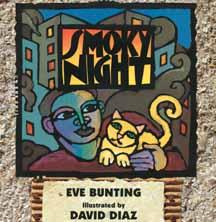Full Text Reviews: School Library Journal - 05/01/1994 K-Gr 3-Daniel and his mother watch through their window as an urban riot is in progress. She tries to explain what is happening as he sees the laughing people break into the neighborhood stores and rob them. One of the victims is Mrs. Kim, whose cat is the enemy of his cat, Jasmine. Daniel's mother doesn't shop at Mrs. Kim's store because she feels it's better to ``buy from our own people.'' Later, their building is set on fire and he and his mother go with their neighbors to a shelter. The boy worries about Jasmine, and is relieved when a fireman brings her and Mrs. Kim's cat to the shelter. The felines have learned to get along in their shared danger. Bunting skillfully uses the voice of the child narrator. His innocent view of the riots makes the destructive behavior of the rioters more abhorrent. His suggestion that the cats were enemies only because they did not know each other well enough enables the adults to reach out to one another and bridge the distance their prejudice has kept between them. Diaz illustrates the story with bold, dark, stylized acrylic paintings framed by collage backgrounds of various textured objects usually reflecting the text. When the rioters loot a dry cleaners, for example, the background is wire hangers and plastic film. The pictures are more arresting than appealing, but they invite discussion and will stimulate thoughtful responses to this quietly powerful story.-Louise L. Sherman, Anna C. Scott School, Leonia, NJ - Copyright 1994 Publishers Weekly, Library Journal and/or School Library Journal used with permission. Booklist - 03/01/1994 Bunting says she wrote this story after the Los Angeles riots made her wonder about what riots mean to the children who live through them. A boy and his cat look down from the window at people rioting in the streets below. His mother explains that rioting can happen when people get angry: They want to smash and destroy. They don't care anymore what's right and wrong. The boy says that they look angry, but they look happy, too. He sees them looting Mrs. Kim's grocery store across the street; his mother never shopped there. That night, the apartment building burns, and everyone has to rush out to the shelter. The boy's cat is gone, and so is Mrs. Kim's cat, but a kind fire fighter finds both animals; they were hiding together. Then Bunting overstates her message: maybe the people, like the cats, need to get to know each other, so the boy's mother and Mrs. Kim agree to visit. Diaz's art is powerful--pulsating and crowded; part street mural, part urban collage. In each double-page spread, the background is a photograph of found objects and debris in a variety of textures and jagged shapes. On the right-hand page is an acrylic painting like a view through a heavy window, with thick lines and bright neon colors showing a multicultural cast. In fine contrast, the story is told quietly from the child's point of view, safe with his mother despite the fear, reaching out to the neighborhood community within the chaos. (Reviewed Mar. 1, 1994) - Copyright 1994 Booklist. Loading...
|



